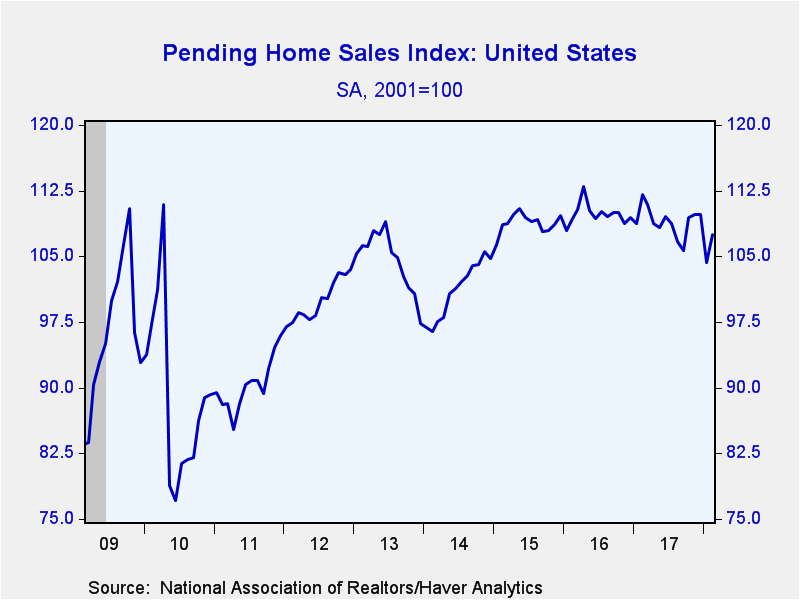 Global| Mar 28 2018
Global| Mar 28 2018U.S. Pending Home Sales Improve
by:Tom Moeller
|in:Economy in Brief
Summary
The National Association of Realtors (NAR) reported that pending home sales increased 3.1% (-4.1% y/y) in February to an index level of 107.5 (2001=100). The gain followed a downwardly revised 5.0% January decline. Winter storms and a [...]
The National Association of Realtors (NAR) reported that pending home sales increased 3.1% (-4.1% y/y) in February to an index level of 107.5 (2001=100). The gain followed a downwardly revised 5.0% January decline. Winter storms and a low supply of homes on the market were indicated by the NAR as holding down recent sales.
Pending sales improved in each region of the country, led by a 10.3% rise (-5.1% y/y) in the Northeast following a 9.0% fall. Sales in the South increased 3.0% (-1.5% y/y) after a 3.8% decline. Sales in the Midwest improved 0.7% (-9.5% y/y) after a 6.6% shortfall, while sales in the West rose 0.4% (-2.2% y/y) after a 2.6% decline.
The pending home sales index measures home sales when the sales contract is signed, analogous to the Census Bureau's new home sales data. In contrast, the National Association of Realtors' existing home sales data are recorded when the sale is closed. In developing the pending home sales index, the NAR found that the level of monthly sales contract activity parallels the level of closed existing home sales in the following two months. The series dates back to 2001, and the data are available in Haver's PREALTOR database. United States Population Weighted Heating and Cooling Degree Days dates back to 1949 and can be found in the USECON database.
| Pending Home Sales (SA, 2001=100) | Feb | Jan | Dec | Feb Y/Y % | 2017 | 2016 | 2015 |
|---|---|---|---|---|---|---|---|
| Total | 107.5 | 104.3 | 109.8 | -4.1 | 109.0 | 109.8 | 108.8 |
| Northeast | 96.0 | 87.0 | 95.6 | -5.1 | 97.2 | 96.4 | 90.8 |
| Midwest | 98.9 | 98.2 | 105.1 | -9.5 | 104.8 | 107.4 | 107.1 |
| South | 125.7 | 122.0 | 126.8 | -1.5 | 123.8 | 122.9 | 123.1 |
| West | 96.9 | 96.5 | 99.1 | -2.2 | 99.6 | 102.4 | 102.2 |
Tom Moeller
AuthorMore in Author Profile »Prior to joining Haver Analytics in 2000, Mr. Moeller worked as the Economist at Chancellor Capital Management from 1985 to 1999. There, he developed comprehensive economic forecasts and interpreted economic data for equity and fixed income portfolio managers. Also at Chancellor, Mr. Moeller worked as an equity analyst and was responsible for researching and rating companies in the economically sensitive automobile and housing industries for investment in Chancellor’s equity portfolio. Prior to joining Chancellor, Mr. Moeller was an Economist at Citibank from 1979 to 1984. He also analyzed pricing behavior in the metals industry for the Council on Wage and Price Stability in Washington, D.C. In 1999, Mr. Moeller received the award for most accurate forecast from the Forecasters' Club of New York. From 1990 to 1992 he was President of the New York Association for Business Economists. Mr. Moeller earned an M.B.A. in Finance from Fordham University, where he graduated in 1987. He holds a Bachelor of Arts in Economics from George Washington University.
More Economy in Brief
 Global| Feb 05 2026
Global| Feb 05 2026Charts of the Week: Balanced Policy, Resilient Data and AI Narratives
by:Andrew Cates








